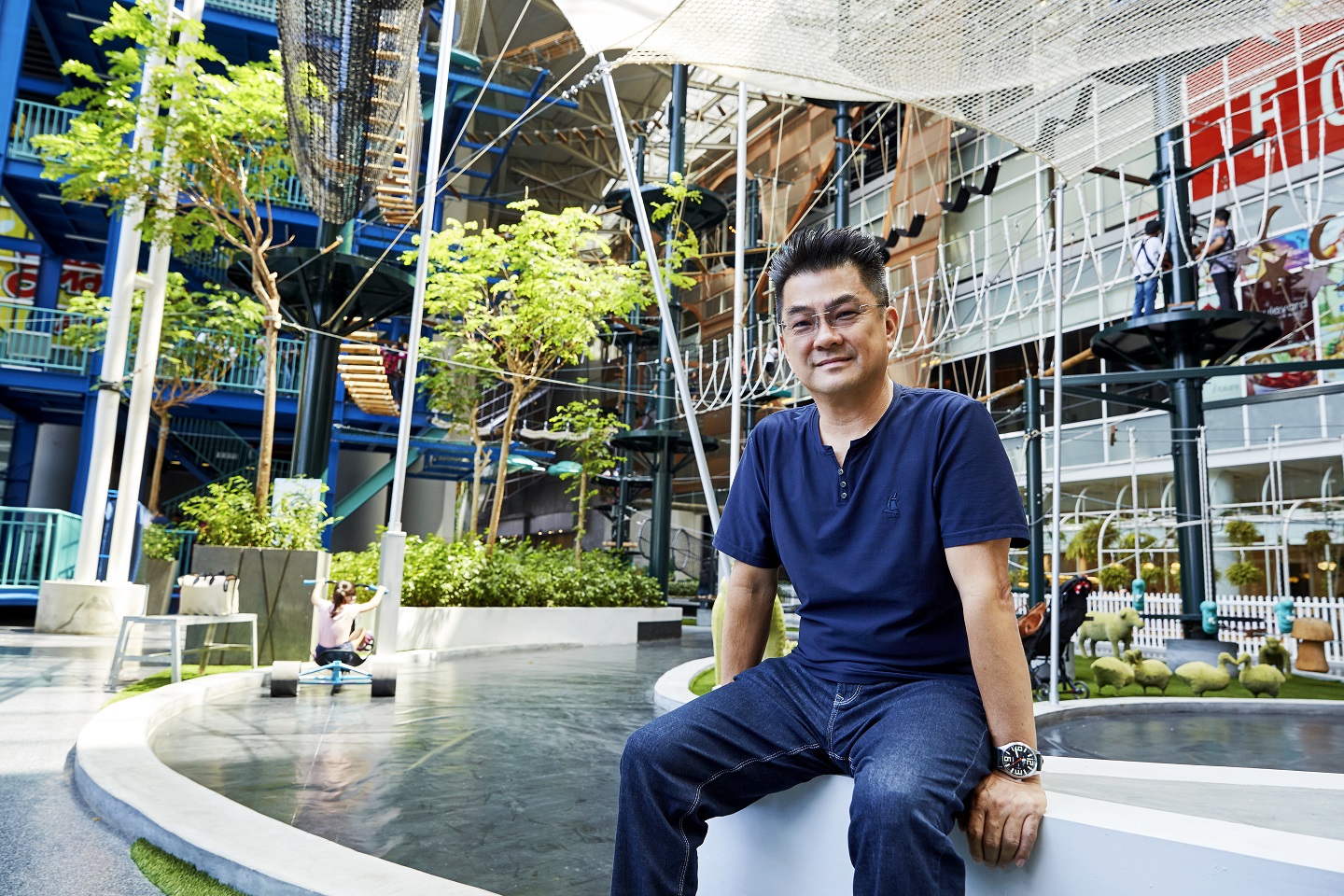
The pastimes Sim enjoyed with carefree abandon now frame the ethos of Escape (Photo: Soophye)
Rediscovering childhood play offers Sim Choo Kheng an escape from the busyness of life. It reconnects him with nature and is more fun than the fixes adrenaline addicts crave.
“There’s a misunderstanding that theme parks are extreme. I am not an adrenaline junkie and nothing is extreme here. But we are all endorphin junkies. Endorphins are happy hormones, unlike adrenaline, which pumps you up in the face of danger,” Sim says.
By “here”, he means Escape Challenge in Paradigm Mall, Petaling Jaya, a cheery place that gets sun and breeze on one front and brings the outdoors indoors through intense, self-directed play. It is the second project Sim has designed and built under his own brand, after Escape Theme Park, Penang, which has three different concepts — Adventureplay, Waterplay and Gravityplay — spread across 44 acres of land. Visitors can also experience an overnight stay at its Base Camp.
“Escape comes from the idea that in the last 20 years, we have gone for broke building shopping malls. We live indoors, have sedentary lifestyles and are trapped in our own way of doing things. There is a need to escape, literally and in our mindset. This brand is very close to my heart. It is recreation-based, unlike conventional mechanical theme parks that offer roller-coaster rides, high-drop towers, carousels and movie-themed attractions.”
Sim is chief executive of Sim Leisure Group, which develops, operates and manages theme parks worldwide. Among the projects he has worked on are Legoland in Denmark and Malaysia, Singapore’s Universal Studios, Yas Waterworld in Abu Dhabi and Cairo’s Ski Egypt. His CEO acronym also translates as chief escape officer, a position he clearly relishes as it reminds him of his youth.
ec_landscape_1.jpg
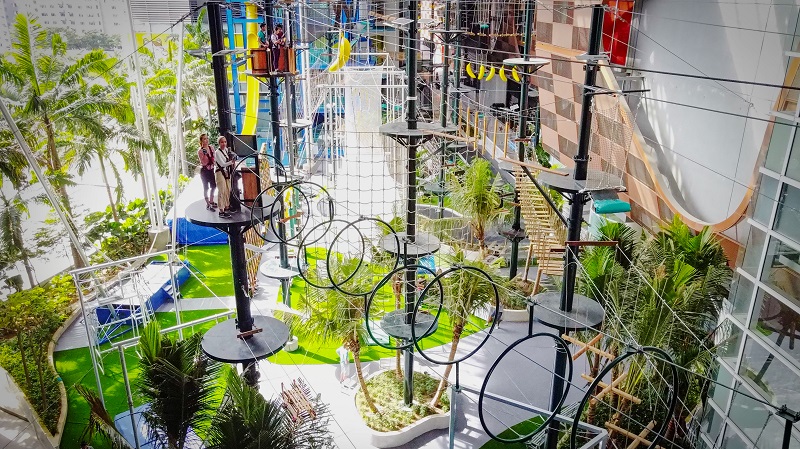
“I am the product of circumstances,” says Sim, 55, who grew up in Thean Teik Estate (now Farlim), Penang, where the surrounding hills and streams were his playground. His family lived off the land, growing vegetables and breeding poultry and pigs. Like most poor children left to their own devices, he and his pals devised their own amusement.
“We climbed trees, dived into streams and created our own games. We would pull down a branch of the jambu tree and send a friend airborne. We spun tops; to be able to spin a top, you had to try about 50 times. We played kali toi and were able to talk about the rules [of players dashing past opponents positioned along a designated grid] before we started running.”
Sim is serious about letting children play; the life skills he picked up at the playground — creativity, perseverance, communication — serve him well today. The pastimes he enjoyed with carefree abandon now frame the ethos of Escape, whose high-fun, low-tech business model means its parks cost less to build and are easier to maintain. “Our capex could be 10 times less than that of mainstream theme parks, which sometimes fail because they overspend and have a mismatch of costs.”
Bringing retro-eco fun to urban settings is another benefit that can entice children to switch off their computer games, get up to flex their limbs and indulge in the pleasures of physical activity. His advice to parents is to leave their kids at Escape when they visit and let them explore. Following where curiosity leads, children learn a sense of responsibility. “Sometimes, the ability to do something is a matter of our mental state — do we dare do it? We have a few games that help eradicate height phobia. After you jump once, you know you can do it the next time. The same with many things in life — how difficult something is is a matter of expectation and attitude.”
People ask why he came up with the Escape concept. He says: “There’s a kid in me ... I’m a 15-year-old with 40 years of experience.”
ec_monkey_business_2.jpg
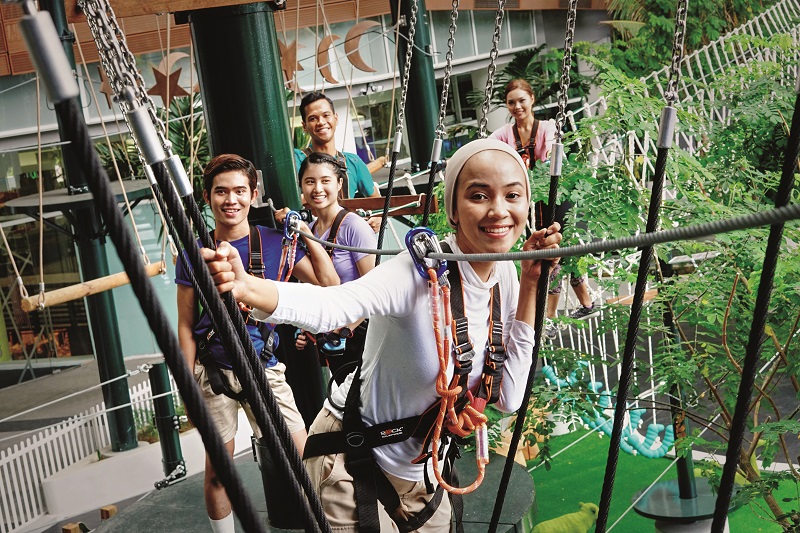
Then comes the inevitable question: Is it safe? “To use an analogy, I would say it’s as safe as playing football. You have fun, it is physical. You will kick and you will fall, nothing life-threatening. Safety is our business; we have ISO quality certification and stringent safety SOPs.”
Sim sees a need to introduce kids to danger, a notion pooh-poohed by many. “Everything is structured and institutionalised nowadays, that’s why human beings have become more and more herd — we are uniform. We need a lot more people who are able to problem-solve — it requires creativity and critical thinking — people who persevere and are persistent.”
Attitude and a willingness to learn count more than paper qualifications or experience, he thinks. When a person with average intelligence has those attributes, “everything can happen. Actually, we need a lot of street-smart people to come and grow with us, a Malaysian brand. Street-smart people bring management skills and can work hard”.
Another concern of visitors is whether Escape will pursue fun at the expense of safety. Sim’s reply is reassuring. “We design safety [features] based on our understanding of our customers — the current generation, not mine, which had better motor skills and hand-leg-body coordination. As much as we can, we will put in padding, fall-arrest equipment and full harness, and ensure people land on something soft. We will not compromise safety for fun but we will push the limits because it is always about endorphin fun.
“Do you know we have the longest tube water slide in the world at Waterplay? The slide speed is 30kph; we will never try to make it the fastest. But the twists and turns as you go through the jungle is the fun, the pleasure. That’s the difference between being scared and being happy.”
ec_aerobat_4.jpg
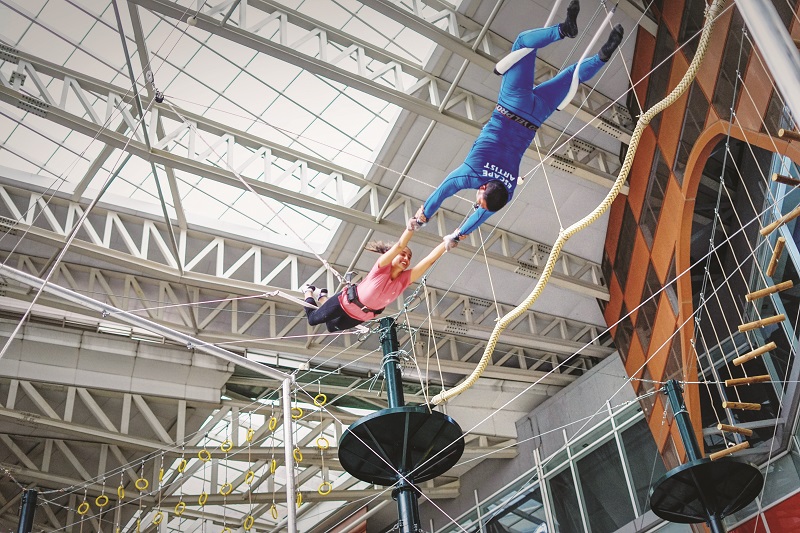
The same rationale applies to taking calculated risks in business versus doing something silly, like speeding at 200kph or jumping off cliffs. “We will use creativity to give visitors different experiences rather than put someone on a 200kph rollercoaster. We’re selling a business to everybody. Adrenaline junkies are just a minute percentage of the population,” adds Sim, who prefers an endorphin fix to an adrenaline rush.
The inspiration for Escape struck him in 1998, when he was working on a project in Vietnam and living in a village outside Ho Chi Minh City. Watching the villagers climb trees, fly kites, cycle and run transported him back to Penang and made him ask: “Why can’t I develop a park based on my childhood activities?” Sim was travelling a lot then, to Armenia, Bulgaria, Dubai and Bahrain, but the thought lodged in his mind and he began incubating and recording his ideas.
In 2009, when the then-new Penang state government called for a new tourism vision, he headed home and set out to build Escape. Reality hit when he tried getting a loan: All the banks he approached told him it was not viable.
“I thought I was going to fail, so I scaled down the whole project and used my own life savings. I put in RM8 million, everything I had. My wife was devastated. ‘Are you sure?’ she kept asking.”
Worse was to come. On the day Escape Penang opened in November 2012, the VIP was asked to present an Escape Passport to the first visitor. “He waited for one hour. I felt like I was going to die. I wished I was dead,” says Sim, who does not shy from telling people this real story. “That first day, we had about 30 customers. I told myself, ‘This time, jia lat lah’ (to drain away strength, in Hokkien). It was scary.”
As the proverb goes, all things come to those who wait. “It has worked,” he adds. After that sluggish start, the school holidays came and Escape was profitable from the next month, and [has been] every year since. It listed on the Singapore Exchange in March 2019.
ec_landscape_3_1.jpg
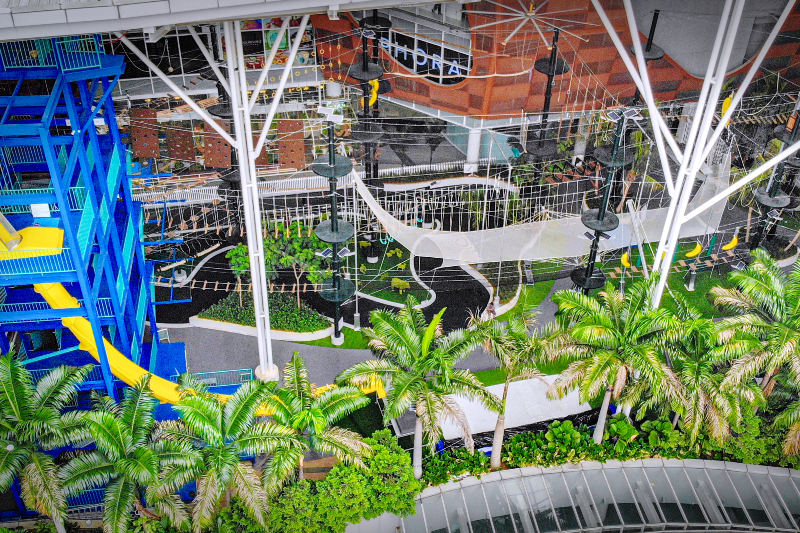
“If your idea is great — a theme park that takes people back to nature with play-centric attractions — and you manage the business properly, it has to make money. Yes, the novelty will wear off, that’s why we always innovate. Escape Penang was built on a construction dump. We rehabilitated the land and have planted 3,500 trees. We keep adding things as we grow and reinvest our profits into the park. Every year, new customers keep coming in.”
Sim walks the talk and brings more than three decades’ experience to bear. “I designed all the park equipment and would be the first to try all the rides. If you talk about water quality, I understand that. If you talk about building a structure, I know. I learnt over the years on the job. Curiosity ... that’s the main thing. We stamp out the curiosity in kids. We don’t challenge anymore.”
He trains his sons, aged 27, 24 and 14, to always question and not take things at face value. Two of them work with Escape, in marketing and park operations.
“If you want to become a successful person, you need individualism, be yourself. I’m a non-conformist. I had the chance to be inquisitive and creative because we were left to fend for ourselves. There were nine of us and we were so poor. There was no controlled environment, no institutionalised learning. We could do whatever we wanted. If you want to study, you study. If you don’t, never mind.”
Sim did not believe in academic learning and dropped out of his Bachelor of Arts course at the National University of Ireland. He then put his back into learning the leisure business. “Hard work is in my nature,” says Sim, who had a role model in his mother, “the most hardworking person on earth”. Mum, an illiterate immigrant from China, used to tell him that hard work never killed anyone and there is no short cut to success. “I travel a lot, sleep on chairs at airports or on the plane. Certain people say beh lah, khan khor (cannot, it’s difficult). Real life is tough, but our threshold of pain is a matter of training.”
ec_gecko_tower_1_1.jpg
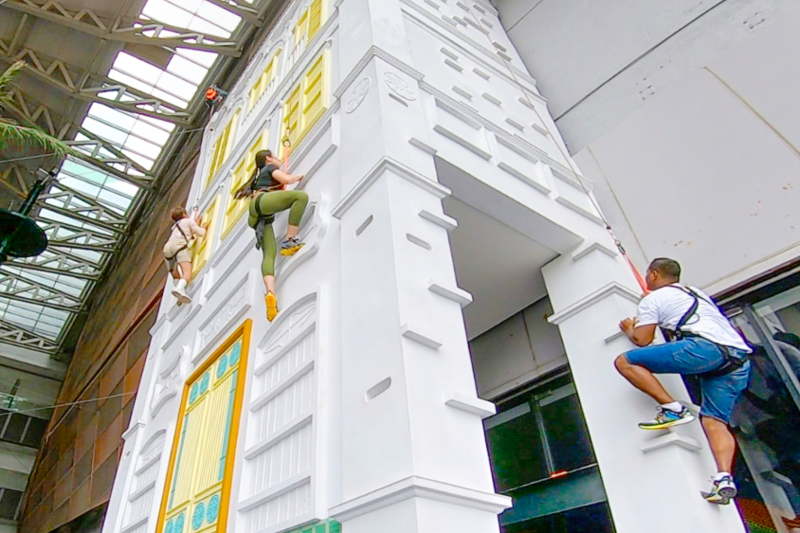
Covid-19 has curtailed travel for Sim, who used to go abroad every week. He is a resident of the United Arab Emirates and has an office in Dubai, from which his team designs and builds parks for international clients. The last year has been a “financial and mental torment”, but he has stayed sane by keeping busy, especially with Escape Challenge, which opened in August 2020, closed during the Conditional Movement Control Order and MCO 2.0, then reopened in March. He views the pandemic as a temporary setback — “nature’s way of teaching us a lesson” — from which humans have to move on and look forward.
With his own brand poised for expansion, things could take a new turn.
“Escape is very personal to me. Now, I would insist that if a project involves me, it will have to be Escape. I will not spend time on things I don’t believe will work. It’s like music — you cannot go into the business if you are tone deaf or don’t have the moves. The same goes for our business: You need to have the DNA.”
Sim, who loves music and thinks the best songs were composed in the 1980s, is focussed on growing his brand globally and making it the most profitable theme park company in the world — aspirations that keep him going.
Agreements are in place to build Escape parks in Sri Lanka, while plans for Singapore and Guangzhou are under discussion. More mall-based Escape Challenge parks will be set up in the Klang Valley as well as China, says Sim, adding that fun is for everyone.
ec_zoom_bug.jpg
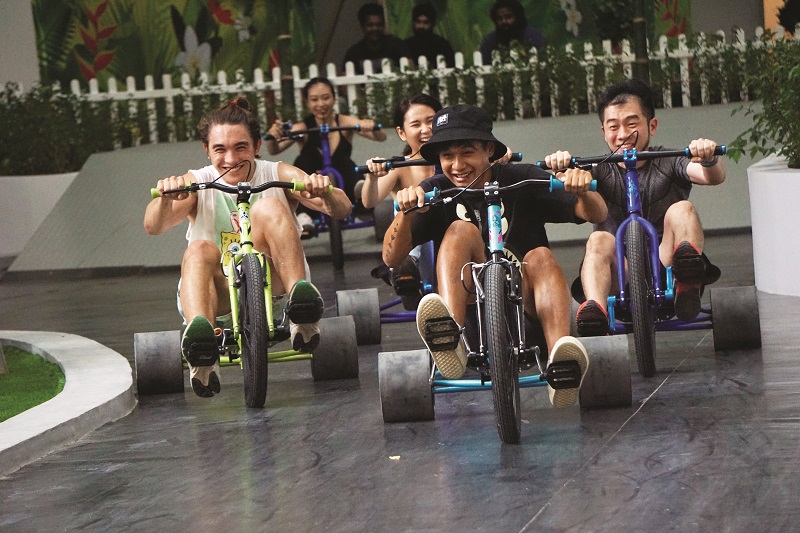
He is excited about his recent acquisition of KidZania, the Mexico-based edutainment franchise, and “bringing in our management style, business acumen and creativity” to attract more visitors, improve customer experience and involve parents in role-play activities at the indoor interactive city designed for children.
Organic growth plans for Escape were behind his decision to relocate his family from Penang to Kuala Lumpur last December. The move meant that Sim’s Bulgarian parents-in-law had to shutter the Vintage Bulgaria Restaurant & Bar they ran with his wife, Silviya Georgieva, in Tanjong Bungah.
Silviya, an executive director of the leisure group, is his “main right-hand person”. An only child, she had brought her parents to live in Penang after her marriage 17 years ago. Sim jokes that he ‘inherited’ them and Silviya brought up his two older boys, sons by his late first wife.
“I love challenges. When my wife asked if I was sure about bringing her parents, I said, ‘If you don’t try, you never learn’. Life is full of surprises, as long as we have an open mind. I have learnt that an [extended] family structure is effective — we learn to compromise. I’m blessed that we get along well. Growing up with a big family is lau juak (merry).”
This article first appeared on April 26, 2021 in The Edge Malaysia.


